News
17 June 2024
Gauging Antarctica’s sponginess from space

05 March 2024
Taking the pulse of Earth’s ecosystems
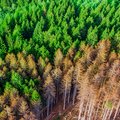
Susan Steele-Dunne has been awarded a NWO Vici grant. She will explore how to monitor the pulse of the Earth’s ecosystems using radar observations. Variations in radar observations from a forest during a day can reveal early warning signs of declining health conditions of a forest. An improved understanding of these processes will allow us to make better predictions of how ecosystems will respond to respond to climate change. In the long term, it may even offer opportunities for early interventions.
12 February 2024
Clouds disappear quickly during solar eclipse
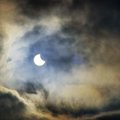
Cumulus clouds over land start to disappear almost instantly during a partial solar eclipse. Until recently, satellite measurements during the eclipse resulted in dark spots in the cloud map, but researchers from TU Delft and KNMI were able to recover the satellite measurements by using a new method. The results may have implications for proposed climate engineering ideas, because disappearing clouds can partly oppose the cooling effect of artificial solar eclipses. The results were published today in Nature Communications Earth and Environment.
08 January 2024
Unique permanent coastal observation detects minimal changes
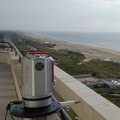
A team of researchers from TU Delft has succeeded in long-term mapping of beach topography to within a few centimetres. The unique dataset provides insights into coastal changes for every hour, for three years. This data is important for dune maintenance and to keep the hinterland well protected. The methodology is also being used to monitor other coastlines and even glaciers. The data are open source and published in Nature, and the new methodology was also recently published.
28 September 2023
Ruisdael Observatory maps atmosphere of the Netherlands
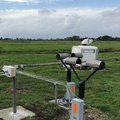
What was just a dream five years ago is now starting to become reality. Thanks to hundreds of sensors and several measurement towers, the Ruisdael Observatory continuously provides a clear picture of the atmosphere above the Netherlands. The oldest measurement tower in Cabauw has been in place for 50 years.
03 August 2023
Peter Teunissen awarded Fellow and Honorary Member of IUGG
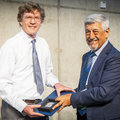
Professor Teunissen of Delft University of Technology, the Netherlands, was elected Fellow and Honorary Member of the IUGG ‘for his exceptional contributions and international leadership in the geodetic sciences, satellite positioning and navigation
25 April 2023
Philip Conroy (GRS) receives Frans Barends award

Philip Conroy (Geoscience and Remote Sensing) received the first Frans Barends award for early career researchers from the UNESCO Land Subsidence International Initiative (LASII).
23 January 2023
Paco Lopez Dekker: Bij NASA zijn ze jaloers op wat wij in Europa doen

In 2029 gaan twee Europese satellieten voor aardobservatie de ruimte in. Paco López-Dekker is hoofdonderzoeker van de missie. López-Dekker is aan de TU Delft hoofdonderzoeker van een satellietmissie die de Europese ruimtevaartorganisatie ESA afgelopen september selecteerde als de 10de Earth Explorer. Dat zijn missies met als doel te monitoren hoe processen op aarde veranderen door mensen. López-Dekker is de eerste Nederlandse hoofdonderzoeker van een Earth Explorer. Samen met zijn team bedacht hij de Harmony-missie en nu begeleidt hij de ontwikkeling ervan.
05 December 2022
Christian Tiberius in het IEEE Spectrum

Modern life now often depends on GPS (short for Global Positioning System), but it can err by several meters in cities. Now a new study from a team of Dutch researchers reveals a terrestrial positioning system based on existing telecommunications networks that can deliver geolocation info accurate to within 10 centimeters in metropolitan areas.
05 December 2022
Christian Tiberius in het AD: Nooit meer de weg kwijtraken

Wie kan er nog navigeren zonder gps? In grote steden met veel hoogbouw verdwaal je makkelijk doordat gps niet altijd vlekkeloos werkt. Door satellieten te vervangen voor een speciaal mobiel netwerk is de weg kwijtraken bijna niet meer mogelijk